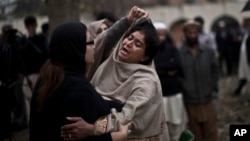International and local human rights groups are demanding Pakistan discard its new anti-terrorism law, condemning it as “a blatant attack” on fundamental rights of the people. But the government is defending the legislation as necesary to tackle “the menace of terrorism” that has plagued Pakistan for years.
The national parliament approved the Protection of Pakistan Act this week, giving sweeping powers to security forces targeting violent extremism and terrorism. Police officers now have sweeping powers to open fire on suspects, and also allows anyone detained for questioning to be held for up to 60 days before charges must be brought.
The legislation has outraged human rights defenders in and outside the country.
In a statement Friday, the independent Human Rights Commission of Pakistan said the government is “deliberately following the model of a police state.” It also criticized parliament for failing to block the anti-terrorism law.
Rights activist Tahira Abduallah says the new law violates international and domestic norms by allowing police to enter homes and arrest people without a warrant, and puts the burden of proving innocence on those who are accused, rather than obliging the state to prove suspects are guilty.
“I think this is a very, very draconian law," Abduallah said. "It has been done with bad intent. It is giving a free hand to the police forces of Pakistan and perhaps even the paramilitary forces to legalize illegal fake encounters and to legalize extra-judicial killings, which are now going to increase.”
New York-based Human Rights Watch criticized the counter-terrorism law for threatening basic rights and freedoms, and said it violates of Pakistan’s international legal obligations. It calls the legislation is "vague and overboard" and gives the government a “green light for abusing suspects in detention, which is already far too common in Pakistan."
Ruling party lawmaker Omar Ayub dismissed those critics, however, arguing the threat of terrorism confronting Pakistan requires extraordinary steps to punish those waging war against the state. The law, he said, will be a temporary measure, probably lasting only about two years.
“We are facing terrorism," said Ayub. "We are facing people who have come from other countries, [they are] illegal in Pakistan and are using our sovereign soil for perpetuating acts of terror which cannot be allowed by any sovereign country. And once we tackle these people the law will itself die its death.”
Parliament voted the Protection of Pakistan Act into law at a time when deadly anti-state attacks are increasing. The military has launched a retaliatory offensive against Pakistani Taliban sanctuaries in North Waziristan, a major source of domestic and international terrorism.
Human Rights Watch and Pakistani critics say they are worried that the "loose language" of the law could be used to crack down on peaceful political protest and bring charges against those who merely criticize government policies.
Analysts contend that strengthening Pakistan's anti-terrorist laws is not the most critical issue. Progress against militants will only come when the police are adequately trained to gather evidence and prepare charges, and protected from political influence and corruption, they say.
Convictions in trials of high-profile militants are rare in Pakistan as a result of deeply rooted corruption in law-enforcement institutions as well as a lack of protection for witnesses, judges and prosecutors, who are often subjected to death threats.




